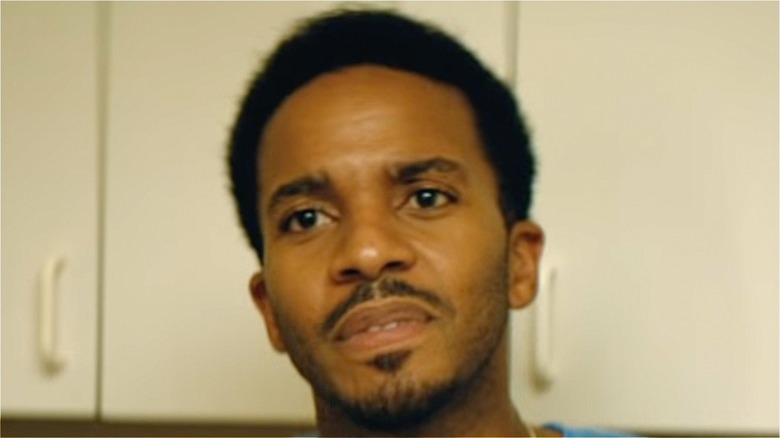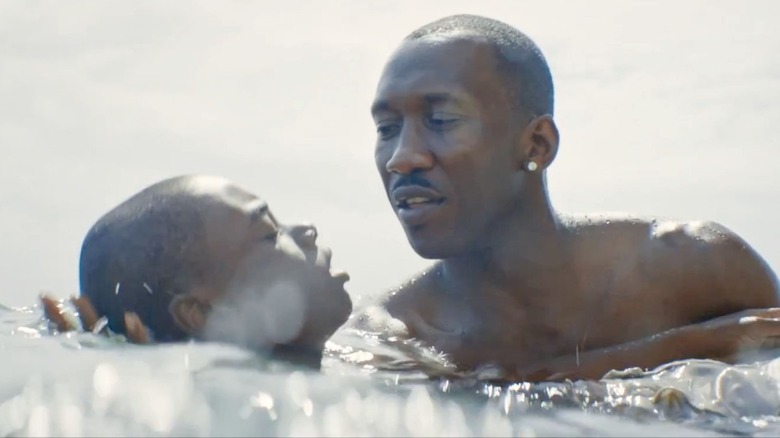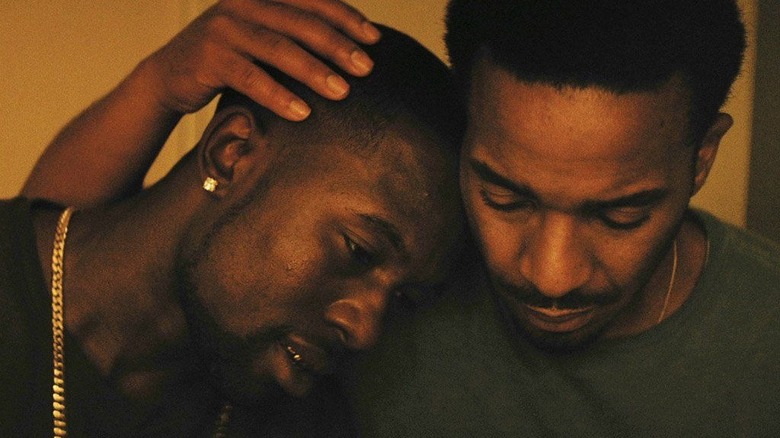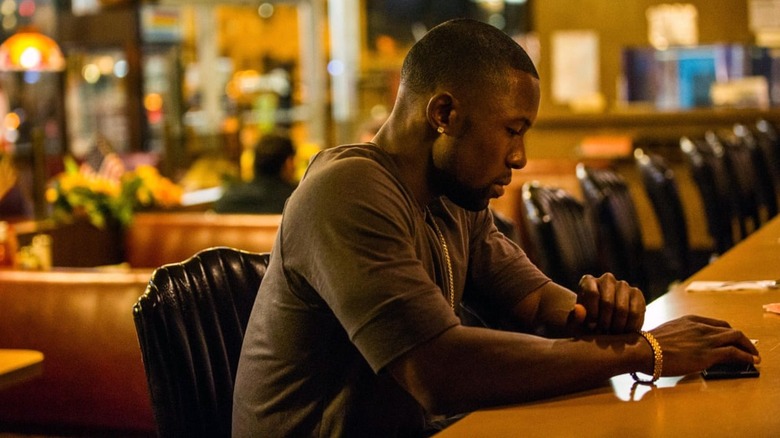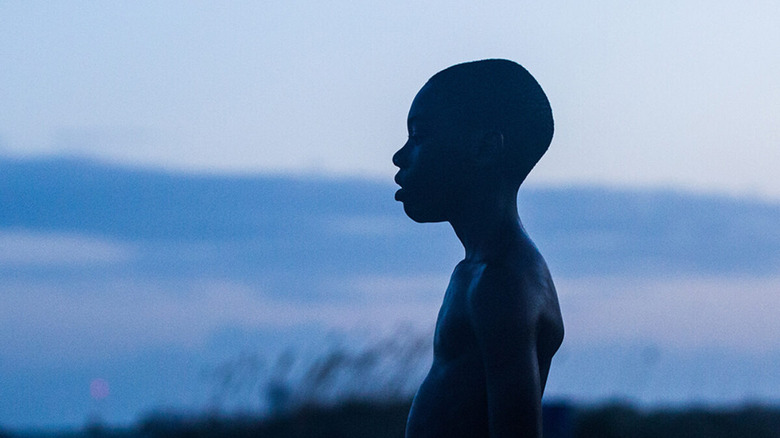The Ending Of Moonlight Explained
"Moonlight" was one of the best films of 2016, winning the Academy Award for Best Picture. The film tells a beautiful story, told in three acts, about its main character Chiron (Trevante Rhodes).
Viewers first meet Chiron when he is a little boy and is troubled by both bullies and an addict mother. While hiding from bullies in an apartment building, Chiron is discovered by Juan (Mahershala Ali). Seeing the boy is troubled, Juan and his wife Teresa (Janelle Monae) take the body into their home before returning him to his mother. Juan becomes a fatherly figure for Juan, teaching him how to swim and giving him life lessons ... however it is later discovered that Juan is a drug dealer.
In the film's second act, Chiron is now a teenager and Juan has unfortunately passed. Teresa still looks after Chiron, to his real mother's resentment. Chiron still deals with school bullies due to his quiet demeanor and sexuality.
The final act of "Moonlight" sees Chiron going by "Black" after following in Juan's footsteps, and becoming a drug dealer in Atlanta. Randomly, Chiron is contacted by an old friend who he has not seen in years. The two reconcile in the climactic moment of the film, right before the final shot shows Chiron again as a child. It's a beautiful ending, but what does it mean?
Chiron's longing for love
To understand the ending of "Moonlight," you have to look deeply at the film's themes and storylines. Firstly, throughout the film, Chiron longs for the love he is missing in his life. His mother is a drug addict who shows him little affection. When she is first introduced, viewers are made to believe otherwise, as she shows concern for her child having been missing all night while he stayed with Juan and Teresa — soon after, though, we see her be neglectful and even cruel.
Chiron does receive love from Juan and Teresa, but unfortunately, by the time Chiron is a teenager in the second act, Juan has passed away. So, Teresa is all that Chiron has left. He does have one friend at school, Kevin (Jharrel Jerome). However, in an unfortunate turn of events, Kevin is forced to beat up Chiron by the school's main bully Terrel (Patrick Decile). This causes Chiron to retaliate the next day by hitting Terrel over the back of his head with a chair during class. Chiron is then picked up by a police car, which leads into the third act.
As an adult, Chiron now goes by "Black," and lives alone. All of these elements combined have made Chiron a solitary and quiet individual, but he still feels lonely and longs for the deeper connections he is missing.
Chiron's sexuality
In the first act of the film, we learn that the other boys bully Chiron because they think he is gay. This is how he initially meets Juan. A group of school boys are chasing him which leads him to hide out in an abandoned apartment where Juan follows him into and takes him back to his home.
Later, in a confrontation between Juan and Chiron's mother, the topic is presented again, as his mother disorderly yells at Juan and asks him mockingly if he's going to care for her son. She then asks him "you ever see the way he walks?" This is followed by her asking him if he's going to tell him why the other boys pick on him? Chiron himself does ask Juan about being gay, but only because of a slur the other boys call him, however Juan tells him it's okay to be gay — just to not let them call him slurs.
In the film's second act, viewers learn more definitely that Chiron is gay, as he is just starting to understand his sexuality. One night, Chiron has a dream about his friend Kevin. In the dream, Kevin is being intimate with a woman, however, Chiron seems to be fixated on Kevin. After this, while on the beach at night, Kevin and Chiron share an intimate moment. The two then part ways, and this is unfortunately followed up by Kevin being pushed, via bullying, to beat up Chiron. The fact that Chiron's one moment of emotional and sexual connection with another individual is immediately punished with violence seems to have a very damaging impact on his life.
Chiron puts up a wall
In the third act of the film, audiences are introduced to a seemingly entirely different Chiron. He now goes by the name "Black," a nickname that was first given to him by Kevin. He looks physically different: beforehand he dressed in a preppy style, was slender, and carried himself in a very insecure manner. Now he is very aggressively masculine, and he employs tough guy mannerisms – clearly, using these as a wall to protect himself from being hurt again by others, as well as a way to run from the little boy he used to be.
Chiron lives alone, but one day receives a call from a now grown Kevin (André Holland) who he has not spoken with in years. Kevin invites Chiron to meet up at the diner he works at to catch up. Chiron reluctantly agrees and the two catch up. Chiron learns Kevin is now a single father and content in life. Kevin, though, is shocked to learn of Chiron's life.
Eventually, the two find themselves at Kevin's apartment where Chiron breaks down, revealing to Kevin that he is the only man Chiron has ever been with. Kevin then comforts Chiron, letting down his wall, and the film closes with a shot of a young Chiron on the beach. So, what does it mean?
Moonlight and masculinity
After all that has happened, at the end of the day, Chiron is still that little boy on the beach. This location is very prominent in Chiron's life: he is first introduced in the film on the beach, Juan teaches him to swim at the beach, and he shares his only intimate moment with Kevin on the beach. The beach is a happy memory and a safe place for Chiron, so this callback to it at the film's closure showcases that he feels safe with Kevin and that really, even though he's built up these tough walls, he is still that same young Chiron from the film's opening.
Furthermore, up until this point, masculinity has played a huge role in the film and Chiron's life. As a little boy, Chiron does not fit the typical idea of masculinity, and the other boys bully him because of this. Later, when he lets down his guard to connect to Kevin in an intimate matter, the world once again punishes him for it. The only positive male role model in Chiron's life was Juan, who he seemingly builds his life after as an adult. He gives into these traditional ideas of masculinity not because they fit him, but as a survival tactic.
What happens next? That final shot of him on the beach, as a boy, tells the audience that he is — hopefully – finding a way to better understand and accept himself, by finally reconnecting with Kevin in the film's closing moments, pointing toward a hopefully more emotionally open future.
